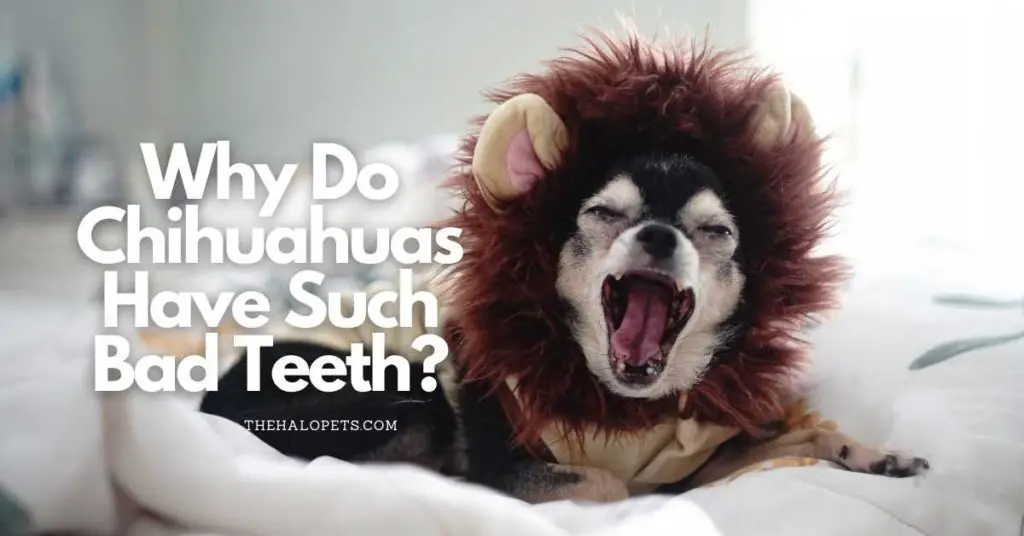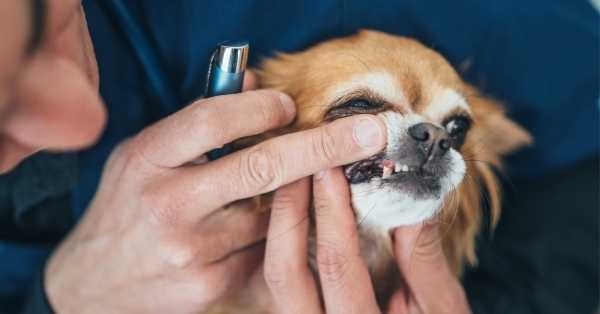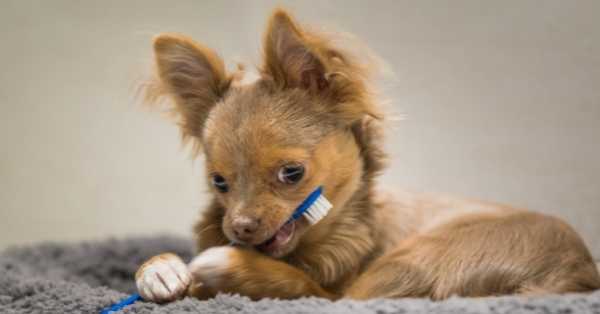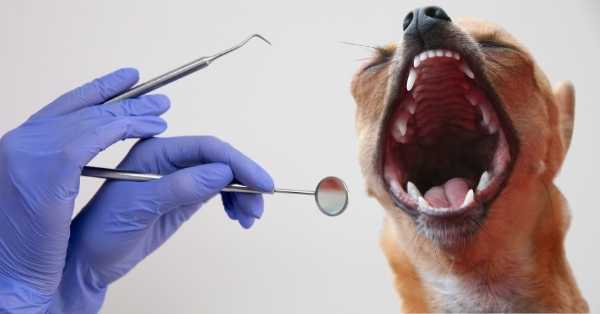When it comes to oral health, chihuahuas truly get the short end of the stick because dental issues are more common than in bigger breeds.
But why are Chihuahuas predisposed to periodontal disease and poor dental health?

Why Are Chihuahua Dental Problems So Common?
According to studies, periodontal disease—a gum infection and inflammation that causes tooth decay—increases when breed sizes shrink.
Due to these few crucial characteristics, toy breeds like Chihuahuas have a greater prevalence of dental problems:
- Retained puppy teeth that have not yet fallen out
- Missing teeth (adult teeth fail to erupt and form a cyst in the jaw instead)
- Missing or a lack of teeth
- Malocclusions (an abnormal bite, typically an underbite)
- Teeth that are too huge for the size of its jaw causing overcrowding
1. Retained puppy teeth that have not yet fallen out

Around 14 weeks of age, puppies often start to lose their puppy teeth. However, for Chihuahuas and other toy breeds, these teeth never come out which causes crowding.
These retained puppy teeth start to create dental health problems if the issue is not identified and handled by a veterinarian, who will typically remove the tooth, since they compromise the health of the adult tooth intended to take their place.
2. Missing teeth (adult teeth fail to erupt and form a cyst in the jaw instead)
Unerupted adult teeth can stay buried in the jaw and eventually develop into cysts when they fail to erupt (another mystery).
The jaw can get compromised or even destroyed as the cyst grows, and it may even eventually result in discomfort or swelling. Unerupted adult teeth can be found and removed right once to minimize the harm.
3. Missing or a lack of teeth
The adult tooth may occasionally not even exist. Even while this typically doesn’t lead to issues, it’s crucial to be sure the tooth is indeed lost and not affected.
4. Malocclusions (an abnormal bite, typically an underbite)

When the mouth is closed, the teeth should interlock properly to prevent malocclusion. An underbite is perhaps the most typical malocclusion we observe in dogs.
Underbites and other malocclusions can cause teeth to rub up against soft tissue in the mouth, which is never intended to happen, or directly against other teeth, despite the fact that some people might think them charming (also not supposed to happen).
Both the hard palate and the gums may suffer serious harm as a result of these aberrant interactions, in addition to the teeth.
Every time the dog shuts its jaws, the teeth are contacting each other, causing tooth-on-tooth contact. This may result in severe tooth attrition (wearing down) and possibly pulp death (the living part of the tooth).
When chihuahuas have malocclusions, it’s possible that certain teeth will occasionally obstruct the emergence of others.
Strategic tooth extractions may be advised to protect the wellbeing and comfort of the remaining teeth if any of the aforementioned conditions exist.
5. Teeth that are too huge for the size of its jaw causing overcrowding
Dogs normally have 42 permanent adult teeth, yet the teeth’s size isn’t necessarily in line with the dog’s size.
In actuality, breed shrinkage has little effect on tooth size. This implies that the teeth of toy breed dogs are just too large for their jaws. This translates to two things: crowding and issues with jaw integrity.
Why is overcrowding a problem?

Think about when you brush and floss your own teeth (you know, assuming that you do floss like you always tell your dentist).
Some teeth may be more difficult to get the floss between than others, most likely because they are closely spaced. Too many teeth make it challenging to completely clean them. As a result, germs thrive here, especially in the stuck-on food particles.
How is jaw integrity impacted?
Well, the roots occupy more space when teeth that are too big are seated in the jaw. Due to this, areas of the jaw where the bone isn’t as thick as it should be become weak.
Dogs who have active dental disease, which may also be deteriorating the jaw bone in those weak locations, are particularly at risk for jaw fractures because of these weak points.
How Do I Know If My Chihuahua Has Dental Problems?
First and foremost, it’s possible that you can’t determine whether your Chihuahua has dental issues.
Some issues are only detected by x-rays or probing, despite being quite painful, as dogs are exceptionally adept at tolerating and concealing suffering (wayyyyy better than we are).
Nevertheless, there may be instances where there are cues that something is amiss:
- poor breath
- unwillingness to chew
- bluish gums
- excessive drooling
- damaged or loose teeth
- stained teeth
- swelling of the face
Consult your vet right away if you are worried that your dog’s teeth are causing a problem.
Since many forms of dog dental disease are hard for us to detect at home, remember to have your vet examine (and ideally perform a comprehensive, anesthetic teeth cleaning) on your pet on a frequent basis.
The advancement of dental illness can be slowed down with regular at-home dental care, and veterinary dental care can offer vital intervention to treat or even prevent disease. Teamwork between the house and the vet is essential for canine dental health!
Neglected teeth can negatively impact kidney, liver, and heart function in addition to causing discomfort and perhaps necessitating tooth extraction.
Make it a routine to wash your Chihuahua’s teeth and examine its gums each day. If you don’t know what your Chihuahua’s “normal” is, you won’t be able to see aberrant signs!
How To Prevent Tooth Decay & Other Dental Problems In Chihuahuas?
1. Brush Your Chihuahua’s Teeth Every Day
The best thing you can do to avoid dental issues in your Chihuahua is to brush its teeth. Use a pleasant, dog-safe toothpaste combined with a soft-bristled toothbrush or finger brush. Consider using a dental chew and toothpaste system if your dog has trouble with hand brushing in order to get the most out of your regular dental practice.
When brushing your Chihuahua’s teeth, avoid using human toothpaste since it contains substances that are hazardous to dogs even in little amounts.
2. Visit The Dentist Regularly
Keep up with routine vet appointments for your Chihuahua, including complete dental examinations. For advice on how frequently your dog should have professional dental cleanings, see your veterinarian.
3. Provide Good Quality Chew Toys
To prevent harming your dog’s small teeth, be sure to provide your Chihuahua chew toys that at the very least can be dented with your fingernail but also have enough “give” to allow some “scrubbing” action on their teeth while they chew.

